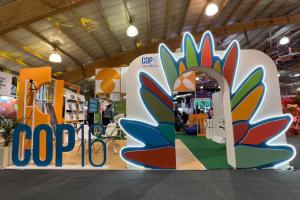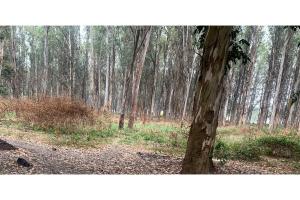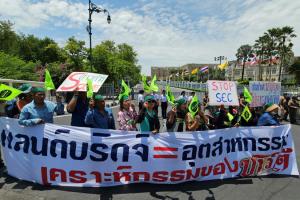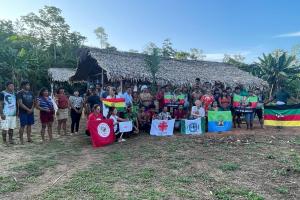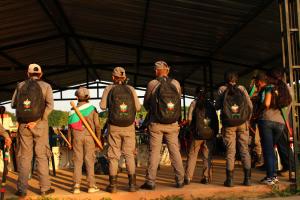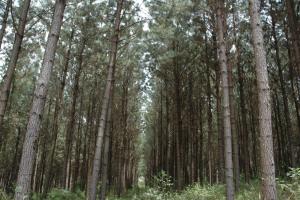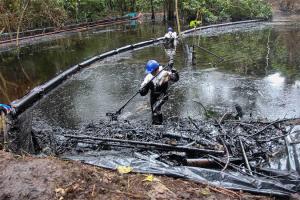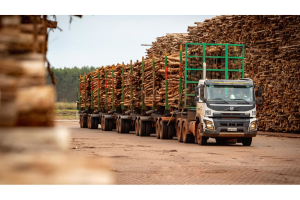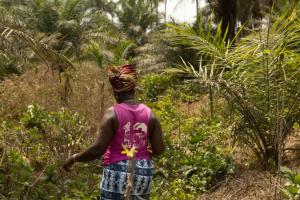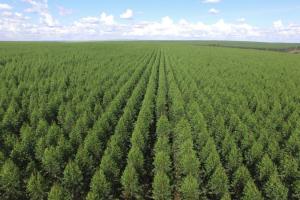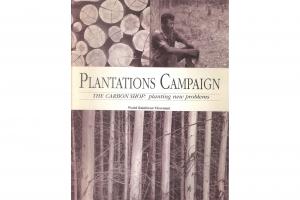Carbon offsetting and REDD
Reducing Emissions from Deforestation and Degradation (REDD+) has become the dominant international forest policy. Variations of REDD+ include Nature-Based Solutions and corporate pledges to achieve Zero Net Deforestation. In reality, though, deforestation continues, polluting companies use REDD+ offsets to avoid reducing their fossil fuel emissions, and zero-net deforestation pledges allow forests to be cleared in one area as long as an “equivalent” area is restored elsewhere.
Bulletin articles
24 October 2024
The Conference of the Parties (COP16) to the Convention on Biological Diversity (CBD) is being held from October 21st to November 1st in Colombia. This initiative has failed in its goal of halting the alarming loss of biodiversity. For 30 years, instead of putting an end to extractive companies' destruction, the CBD's proposals have worsened the situation – through actions that have undermined both the sovereignty of Indigenous Peoples and communities, and their ability to remain in the territories they inhabit and protect.
Bulletin articles
24 October 2024
This article tells the story of a Podcast that is being jointly launched with Solidaritas Perumpuan, a feminist organisation from Indonesia. This espisode is the third in the series “Women’s struggles for land”, produced by WRM together with organisations from different countries. This one tells the story of women's resistance to oil palm plantations, REDD and a large-scale project for food production (Food Estate) in three villages in Central Kalimantan.
Bulletin articles
24 October 2024
In Congo-Brazzaville, tree planting projects intended for carbon markets have proliferated over the past four years. This concerns large-scale developments of monocultures initiated by oil companies under the seductive term of carbon neutrality and promises of job creation for communities. But in reality, they are neither a solution to the climate crisis nor a benefit for the communities of Congo.
Bulletin articles
24 October 2024
With World Bank support, the Thai government is moving quickly to implement its ‘climate policy’ based on carbon offsetting through the use of so-called ‘green areas’. These areas are projected to cover no less than half of the country´s area. Yet hidden behind this ‘green’ discourse is an economic policy that is heavily reliant on the continued use of fossil fuels. (Available in Thai).
Bulletin articles
22 August 2024
This bulletin highlight several cases where the expansion of carbon projects has become an integral part of the extractivist model. Since this model has been destroying territories and people’s livelihoods for a long time, we share articles on both old and new forms of extractivism, and how communities continue to carry on struggles to resist them.
Bulletin articles
22 August 2024
Colombia's Orinoquía region stretches from the foothills of the country's eastern mountain range to the Venezuelan border. This region has historically been associated with the exploitation of rubber, timber, furs and other so-called “natural resources,” to the detriment of ancestral communities. Today, new threats are emerging under the paradigm of conservation, green energy and carbon projects.
Bulletin articles
28 June 2024
A new round of initiatives to plant tree plantation to provide carbon offsets is currently being proposed. Aside from the absurd notion—endorsed by the UN and various national governments—that tree plantations can offset the (climate) damage caused by burning fossil carbon, these initiatives have destroyed people's livelihoods and co-opted vast areas of community land.
Bulletin articles
28 June 2024
Forest conservation and tree planting initiatives to provide carbon offsets are two of the corporate sector's favourite ways to greenwash their image and keep doing business as usual. These initiatives have features that make them very attractive to investors, for example the easiness with which project arguments and calculations can be manipulated. Therefore, it is no surprise that scandals have come to light—which has affected the kinds of projects being developed.
Bulletin articles
28 June 2024
How many tree plantations are there, and how big are they? In what regions and countries are they located? What are the differences among the various "players" who are directly involved in implementing tree plantations for the carbon market? This article presents figures and information seeking to answer these and other questions.
Bulletin articles
27 June 2024
Behind every tree plantation developed for carbon offsets, there are external agents seeking to profit from increased control over the land. And while they all have the same colonial approach, these plantations can vary widely: they can be large-scale monocultures or schemes with smallholder farmers; they can include exotic species or native species; and some of them may even exist on paper only.
Bulletin articles
27 June 2024
Several initiatives have done their part in promoting tree plantations for carbon offsets. Regardless of whether these initiatives are led by the corporate sector, NGOs, national governments, or oil companies, polluting corporations benefit from the diversion of attention away from the need to curb fossil fuel emissions.
Bulletin articles
27 June 2024
We recommend rereading the publication, “The Carbon Market: Planting More Problems,” written by Larry Lohmann in 2000.
